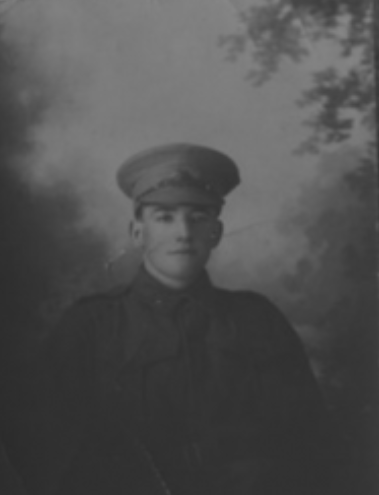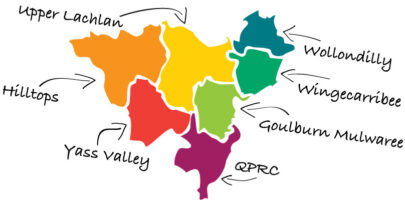Roy James Howard: Great Southern Line
Working as a farm labourer around Dalton when he enlisted in Goulburn in March 1916 (possibly kangaroo march) at the age of 19. Served as a private in 56th Battalion in France. Gassed several times in 1918 and invalided out at the end of the year. His employment record shows that he began work for NSWGR’s Southern Division in 1925 as a temporary labourer. He may have done some work for the railways prior to this, though his work in the remote area of Uardry (near Hay) on an ‘extra’ gang as recalled by his daughter, was probably within the southern division which stretched as far west as Narranderra. It is not clear whether his work for a blue metal mine which supplied ballast for the railway sleepers was part of his NSWGR work or preceded it. In 1928 he became a permanent fettler and then a ganger. Until 1933, when he was attached more specifically to the Goulburn district, he travelled great distances for work. After that, from time to time he worked beyond the Goulburn district in areas of Sydney. When he died he had the position of Ganger who ‘held the Bowral length’ (obit. J Good Sec. Railways).
Born 1896 in Dalton. Family had property ‘Woodside’ acquired as part of a government deal which involved clearing land in a certain time frame. He went to school at Felled Timber Creek Public School where he was a good student and strongly encouraged by his teacher who wrote him a letter emphasizing his potential when he left school in 1910 at the age of 14. His Parents reluctantly gave permission for him to enlist in 1916 when he was 19. The effects of being gassed, although recorded as a ‘slight disability not permanent’, were considerable. When he returned he stayed with an aunt in Exeter who found him a place at Waley convalescent home in Picton. There he met his wife, Martha Larkin, who was working as a nurse (VAD). (note Larkin’s Steam Mill at Picton) They married in 1922. She was 20. He was 26. Albert’s work for NSWGR took his wife and young family to remote locations first to Uardry and then closer to Goulburn at Cullerin, a tiny place, ten miles from the nearest township, Gunning. There the family lived in a little house beside the railway line with Albert often working at other remote places on the line for weeks at a time. These were very lonely years for his wife. After 7 years with Albert getting a position specifically in the Goulburn District of NSWGR, they were able to move into Goulburn. The next move was to Exeter and then to Bowral where Albert bought the ex-gatekeepers cottage from the Railways. Payments towards the cost and interest were deducted from his pay.
As a result of his war experience Albert slept badly and found it hard to spend time with his young children. He always slept with the kero light on. In the early years of his marriage his whole body sometimes jerked into the air as he slept.
He was still working as a ganger for Ways and Works (Per Way) when he died of a brain haemorrhage in 1959 (aged 63). He was a union member and voted Labor. His father had been involved in the Shearer’s Strike in the 1890s.
Roy James Howard 18/3/16 told by Peter Howard
My grandfather Roy grew up in Dalton near Gunning. Like most of those fellows back then he had never been out of the district. He enlisted at age 19 years and 10 months in Goulburn, on the 18 March 1916, and was placed into the 56th Battalion, Embarking on the HMAT Aeneas Troop carrier, on the 30th September 1916, before serving in France.
Roy was gassed a number of times in France and was eventually discharged wounded in December 1918.
After a long convalescence he came back and worked in and around Dalton before he got a job on the railway as a fettler. The first job my aunty can recall was at Uardry on the line to Hay. The railway station is disused now. When he came back to Dalton he worked in an area called Razorback, which was approx. four miles north of Dalton, where he and my grandmother had a tent on the railway line and later a little hut that opened almost directly on to the line. He had a cart and an area of track that he looked after. My aunty remembers walking the four miles into school.
There were a lot of swaggies around in those days (during the Depression). These chaps used to call in. He wouldn’t let them cut wood as he didn’t want his axe handle broken, but he was quite happy to give them a meal.
They lived and worked near Dalton for a number of years and before moving to Goulburn where my grandfather was either a fettler or a ganger. He was very involved in putting in the Goulburn wheat yards.
The next move was to Exeter and then Bowral where he spent the rest of his life. They lived in a house on a tiny little block of land right against the railway track, which is still there just near the pedestrian railway bridge at the end of Bowral street. (The house burnt down in the 1970’s and is no longer there). A train would come past and the whole place would shake. Roy died of a heart attack in 1959, aged 63. Not before that there was an incident on the railway line when he had to get his cart off the line in a hurry when a freight train was coming. It took a lot out of him and they thought it could have contributed.
He was certainly one who didn’t speak much about the war. My father told me he’d been in some difficult positions – one time stuck up in a hollow log, in no man’s land, without food for a number of days – My aunt told me that when he got home he couldn’t get to sleep unless the kero lamp was on.
My aunty Colleen currently has, his medals and some of his letters home. They always began ‘my dearest mother’. Some of them are a bit charred. My father rescued them from my grandfather’s railway house when it burned down after he died. There might also be some photos of the hut.
Family history in Dalton – my great grandfather took up the property as part of a government deal that involved clearing the land within a certain time frame. They called it Woodside – as the house was built on the only bit of cleared land and there was trees on every side.
Interview with Colleen Prest, daughter of Roy Howard
Roy’s DOB 4 May 1896, thinks he might have been born on the property known as Woodside at Dalton. Died: 22 June 1959 in Bowral. Married: 27 April 1922.
Regiment 2421, Private RJ Howard, Served in the 56 Battalion AI, Australian Imperial Forces. Roy embarked on HMAT A6 Aeneas 30 September 1916.
Julie his granddaughter (visiting Colleen from Brisbane) was only 1 when he died. Colleen remembers him at her home on the Sunday before he died trying to get Julie to walk. She would stand up in her playpen and use the bars to walk, he was walking around her playpen encouraging her to let go and walk to him.
He worked on the railway for 34 years – he started at the metal mine (blue metal) for railway lines and then was on what was known as extra gang – it meant to doing extra jobs in the region on the railway. It also meant being moved around the state.
… we were out at Uardry (near Carrathool on route to Hay) when I was a small child. Then we were at Razorback (between Cullerin and Fish River) – the railway wanted a loop line because the country was so steep and heavily loaded goods trains would hold up other trains.
Dad was a ganger after the war. We were 7 years at Cullerin in a little old house beside the railway line. Mum would take him down to Fish River to catch a train to go to work, she wouldn’t see him again for another week or two weeks. She said “I didn’t get married to live alone”. Mum as very lonely there.
Colleen was 7 years old when they moved to Goulburn. He put in what was called the wheat yards down at the railway station (at Goulburn) – the wheat yards was where all the wheat was brought to from across the state before being railed to Sydney. We were only in Goulburn for about 18 months then moved. At that point, after he and her mother talked, he moved to Per Way – because it meant that she didn’t have to be constantly on the move and living alone whilst he worked in remote locations. When they came back to Goulburn and on to Per Way, they moved to Exeter (were there for 13 years) and then shifted to Bowral. He was still working on the railway when he died.
He never mentioned the war to us – I wish he had – when we went to the war memorial (in Canberra), mum could pick out 2 or 3 places where he’d been. “The men didn’t talk about the war, it was something they couldn’t get out of their bodies”.
When Mum and Dad first married, (after he was back from the war), when lying in bed asleep at night his whole body would lift straight up into the air and back down again – it frightened the hell out of her at first.
He had a wonderful mind but never studied. He was a very capable leader – look at this beautiful letter from his school teacher (W Bruce 23 May 1910; photographed and transcribed). Look at his obituary, by D Goode, Secretary of NSW Railways. Mr Goode said Roy was a man the Department could ill afford to lose.
He worked all day this Monday, my mum and sister wanted to go to the pictures. Dad took them, went across road to a pub, talked to a few blokes then drove home into the garage, got out of the car and collapsed. He had a brain haemorrhage. Mum and my sister got home at 11pm and he wasn’t in bed asleep and went looking for him. He’d been at my place the Sunday before (I was 31), he’d been complaining of a crook back.
Yes he was a union man, they all were, they had to be. He voted Labour all his life. He did play cricket at Dalton after the war.
When he came back from the war, he spent a lot of time in his bedroom, he was like that for the rest of his life. He couldn’t stand the sound of us kids talking and playing. He’d take the paper and go into the bedroom. He’d come out for dinner, sit by the fire for a little while and then say, well it’s time for bed. We missed a lot of Dad because of that but he always got along so well with other people. He could control men but he wasn’t harsh.
My sister June Jeffrey is 93 years old.
His dad was a shearer – when the big strike was on, Grandad … well he was educated and could read and write, so he was in the union…. Dad was one of 9 siblings (3 girls and 6 boys). He kept in touch with them – Uncle Dick (youngest brother helped him keep in touch too). The family was scattered.
When we went to Razorback he built a windmill for pumping water from railway sleepers – he could make do with anything. He was wonderful in the garden, but most people were, there weren’t green grocers. We all did it, we had our own cow and grew our own vegies.
But the war ruined his life. Dad was stretchered off the boat that brought him back to Australia – he was so sick from the gas. When he got back to Exeter – he was staying with an aunt, his aunt’s boss got him a bed at Waley Convalescent Home (Picton). It’s where he convalesced and it’s how he met mum – she was a VAD … I think that’s what they call it. He was only 19 when he enlisted. His father and mother signed his papers but they didn’t want to do it.
Monica and Barry Howard are Peter Howard’s parents. Barry was Roy’s youngest brother. He has died.
Colleen and daughter shows me two war medals and a silver badge and a letter from Roy to his parents. Her cousin Peter also has letters and papers relating to Roy that belonged to his Dad Barry.
The Silver War Badge[1] and two medals photographed. A number of documents that belong to Monica and Barry are at Colleen’s home for now – they are letters from Roy to his parents from the Front.
[1] AWM Definition – badge awarded to serving officers from 4 August 2014 as well as to other ranks discharged on account of age, wounds or sickness such as would render them unfit for further service

Roy James Howard from the Collections of Colleen Prest and Peter Howard
Fettler
(Uadry) Goulburn, Exeter, Bowral
War Service record: NAA B2455, HOWARD R J(service No. 2421)
NSWGR Employment Card: NSW Public Records (Staff no: 82363)
Grandson: Peter Howard
Daughter: Colleen Prest
STA MEMBERSHIP
free & connects you to the STA universe
Reach out to us
[email protected]
0427 938 110
Or by appointment at one of our
Mobile Office locations
PO Box 1323 Goulburn 2580
ABN 67 208 214 681
We acknowledge Aboriginal people as the traditional custodians of the lands where we create, live & work.
© Southern Tablelands Arts. All Rights Reserved




